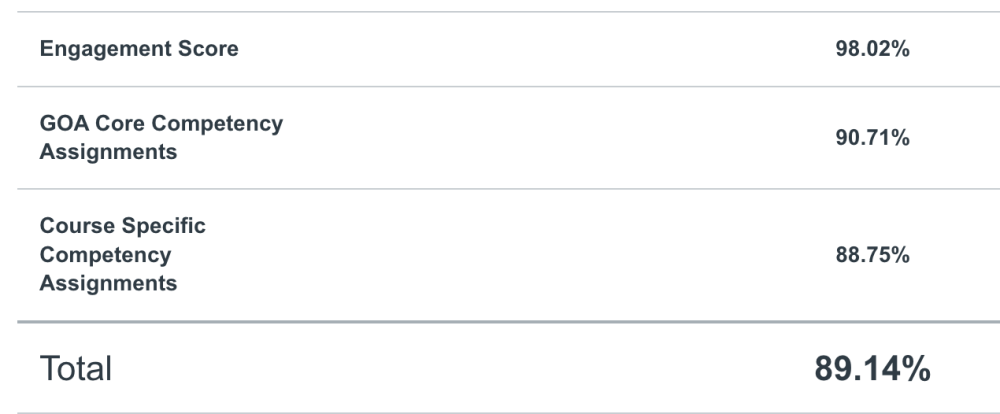Rethinking Competency-Based Grading: How Engagement Scores Transform Student Assessment
Over the course of the last decade, GOA has established competency-based learning as a cornerstone of our work with students. This transition has been an ongoing conversation with teachers, students and colleagues at member schools around what works and what doesn’t. What approaches will lead toward the kinds of high-quality, student-centered, equitable learning experiences that we owe our students? How might we design learning experiences that will support students' transfer of newly acquired skills and understandings into increasingly complex contexts, in and out of school? In the last three years, we have redesigned every single GOA course in order to ensure that our guiding values (agency, equity and transfer) are infused throughout our program. In addition we have reimagined how our students and schools will experience learning assessment, feedback, grading and reporting in a competency-based approach. As a consortium serving students from 140+ schools, with myriad different academic cultures, one of the thorniest issues has undoubtedly been the how of shifting toward a competency-based approach to grading, and in particular, an evolving practice of separating academic skills and contents from behaviors. We think that the introduction of our Engagement Score is a step in the right direction.
On campuses everywhere educators wrestle with the dual goals of teaching academic content and skills, all the while making sure that their students also learn to be responsible, ethical community members. The former is generally the provenance of the classroom teacher and the school’s academic administration, while the latter lands on the Dean of Student’s desk or with a School Counselor or someone else with a role in students’ pastoral care.
We can all, I think, agree on the following three statements:
Smoking in the bathroom or fighting in the cafeteria are behaviors, and they should be handled by a school’s disciplinary processes.
The Adventures of Huckleberry Finn, the quadratic equation and the causes of the Russian Revolution of 1917 are all bits of content, an understanding of which might be graded in particular course.
Delivering an excellent presentation or supporting a thesis with evidence are academic skills (what at GOA would call competencies or outcomes depending on their grain size), the mastery of which may also be graded in a course.
And yet anybody who has ever been in a classroom knows that differentiating between behaviors, content and skills, and the way schools teach them, or reward/punish students for them is seldom so neat. Classroom teachers, in particular, are constantly coaching and correcting students on the kinds of behaviors that lead to success. Arriving late to class and slumping down in the back of the room are certainly behaviors, and you can bet teachers should engage students in a conversation about them. But should they grade these behaviors? Similarly, turning in an assignment late, violating academic integrity policy or always being the first to volunteer are behaviors. At a certain level, some of these things will earn an award or disciplinary action at many schools. The question I’m most interested in at the moment, however, is whether they also impact students’ grades - which are ostensibly a measure of what the students know and the academic skills that they’ve mastered.
At many schools, things like late work, missing work, and class participation are examples of behavioral issues that are baked into students’ grades, thus clouding the representation of what the student can and cannot do from an academic standpoint. As Thomas Guskey writes, the result of this kind of hodge-podge grading is that “the final grade remains a confusing amalgamation that's impossible to interpret with any accuracy or clarity.” Furthermore, researchers like Joe Feldman express concern that this kind of mixing of behaviors and skills systematically disadvantages students whose personal lives are more likely to interfere with their academic progress, that is, that it disproportionately penalizes historically marginalized students. Clearly, if we’re in the business of reimagining education, we need to be questioning and designing away from these kinds of systemic inequities and inaccuracies, no matter how culturally ingrained they may be, and no matter how many iterations it may take.
The How: The Evolution of Competency-Based Grading
Because we’re a competency-based, online school, at GOA, we’ve endeavored to think differently about the impact of behaviors and skills on students’ grades. We have worked to design systems and approaches that allow us to avoid using grades to coerce certain kinds of behavior but rather to keep them focused on academic skills (competencies) while also being clear with students about the kinds of behaviors that will help them learn and thrive, in college, career and life.
Beginning three years ago, all GOA grades were based entirely on students’ level of mastery of the competencies that are the goals of their courses. Teachers and students are clear about which competencies and learning outcomes are being targeted on a particular assignment, and they use those targets to give students feedback on rubrics. The information teachers put on the rubrics is used to generate a numeric competency grade. (If you want to do a deep dive into how we manage this, check out my previous piece, How We Grade and Why?). All of that sounds great, right? Except, what do we do with the hypothetical student who knocks the ball out of the park on the first three assignments, earns “Mastering/Advanced” marks on their competencies, and then doesn’t complete another assignment for the rest of the semester? Do they earn the 95%/Advanced that their first few assignments suggested was reflective of their skills?
Enter the Engagement Score
We are committed to having the grades that students earn in our classes be reflective of their level of mastery of the competencies around which the course is centered as long as they are committed, engaged members of the online community - and we measure that with our Engagement Score metric. Students can always see their competency grades and their Engagement Score in the LMS, and they know that if their Engagement Score drops below 70%, their GOA teacher will not have sufficient evidence of their learning to assign a passing grade. We actually have an automation that overrides a student’s course grade in the LMS with “Not Passing - Insufficient Evidence” if and when their Engagement Score drops below that threshold. 70% is a floor, a minimum, a mark of sufficiency without which we cannot make a professional judgment on what the student has really learned. It’s a lot like the common school policy that says that students who miss 30% of class meetings don’t pass the course. Students keep their Engagement Scores high by turning in the work, doing so punctually, participating fully in online discussions, showing up to Zoom meetings and communicating proactively with their teachers and peers. In previous years, we used an approach that we called Assignment Completion Rate (ACR), which was just that: the percent of assignments the student completed. Based on feedback from faculty and school Site Directors, however, for 2024-2025 we have moved to this more evolved, more nuanced metric for understanding whether a GOA student is an active member of the community who is truly thriving in our globally networked courses.

In effect, what we’ve done is take many of the grading policies that many teachers use to influence behavior and encourage compliance, and we’ve set them aside in their own category, separate and apart from the competency grade. Do those behaviors remain important? You bet they do, and our teachers are all about coaching students in those areas. The result is that the hypothetical student who stops completing work in week three of the course, isn’t going to pass a GOA course. Their Engagement Score would not reach 70% and we wouldn’t have sufficient evidence to comment on their level of mastery (though you can bet our Student Support team would do everything it could to bring that student back into the community!). A different student, however, say one who is similarly skillful, but who missed two assignments because they got overwhelmed with their after-school job or the pressure to complete a bajillion early action applications, is not going to find two fat zeroes sitting in the gradebook slowly anchoring their grade to the sea floor. If that’s their only blip of the semester, their Engagement Score will be well above 70% and the grade on their transcript will be entirely based on their mastery of competencies.
A Nudge: How Might We Think Differently about the Difference Between Skills and Behaviors?
In short, while you may have less or more control over grading policies in your context, I would invite educators to think about which of these kinds of approaches are within their locus of control. Do you have murky “Participation Grade” that is really about a student’s behavior in your class? How might you get more explicit about which elements of class participation are indeed academic skills, and which should be left out of the grade altogether. And how about late and missing work policies? How might you coach students on the importance of meeting their commitment and being good school citizens without sullying our grades with inaccuracy and inequity? Our approaches to competency-based learning at GOA are ever-evolving and improving, and we think that creating a separate Engagement Score for our students that stands apart from the course grades is a step in the right direction toward answering these questions.
As we continue to refine our assessment practices, there's always more to explore. If you're interested in diving deeper into competency-based approaches or discussing these ideas further, we invite you to explore GOA's professional learning opportunities.
For more, see:
- Back to School 2024: Curiosity vs. Certainty
- The PLaybook: How Do You Show Up? Revisiting Your Educator Presence
- How We Grade and Why
GOA serves students, teachers, and leaders and is comprised of member schools from around the world, including independent, international, charter, and public schools. Learn more about Becoming a Member. Our professional learning opportunities are open to any educator or school team. Follow us on LinkedIn. To stay up to date on GOA learning opportunities, sign up for our newsletter.


